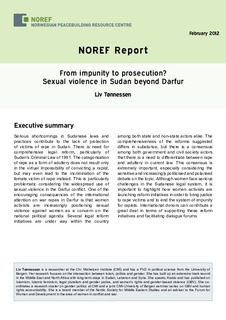From impunity to prosecution? Sexual violence in Sudan beyond Darfur
Research report
Permanent lenke
http://hdl.handle.net/11250/2475358Utgivelsesdato
2012-03-01Metadata
Vis full innførselSamlinger
- Publications [1488]
Originalversjon
(NOREF Report, February 2012)Sammendrag
Serious shortcomings in Sudanese laws and practices contribute to the lack of protection of victims of rape in Sudan. There is need for comprehensive legal reform, particularly of Sudan’s Criminal Law of 1991. The categorisation of rape as a form of adultery does not result only in the virtual impossibility of convicting a rapist, but may even lead to the incrimination of the female victim of rape instead. This is particularly problematic considering the widespread use of sexual violence in the Darfur conflict. One of the encouraging consequences of the international attention on war rapes in Darfur is that women activists are increasingly positioning sexual violence against women as a concern on the national political agenda. Several legal reform initiatives are under way within the country among both state and non-state actors alike. The comprehensiveness of the reforms suggested differs in substance, but there is a consensus among both government and civil society actors that there is a need to differentiate between rape and adultery in current law. This consensus is extremely important, especially considering the sensitive and increasingly politicised and polarised debate on the topic. Although women face serious challenges in the Sudanese legal system, it is important to highlight how women activists are launching reform initiatives in order to bring justice to rape victims and to end the system of impunity for rapists. International donors can contribute a great deal in terms of supporting these reform initiatives and facilitating dialogue forums.
